Coaching and Mentoring Project 1: Strategies, Factors, and Ethics
VerifiedAdded on 2022/12/30
|34
|11704
|1
Project
AI Summary
This project, designed for an ILM Level 7 Certificate in Coaching & Mentoring, delves into the organisational context of coaching. Project 1 examines alternative organisational strategies for developing leadership, factors impacting coaching at a strategic level, and the differences between various coaching methods. It further explores ethical practices, codes of conduct, and the role of coaching in improving individual and organisational performance, including an evaluation of coaching within a specific business environment. Project 2 focuses on communication, emotional intelligence, and relationship building in diverse environments, analyzing ethical values and their impact on coaching relationships, and assessing personal competence in supporting others' development. Finally, Project 3 outlines how to establish effective coaching relationships, discuss client development needs, and integrate peer coaching, supervision, and feedback to improve coaching practice. The project emphasizes ethical considerations, practical application, and the ongoing development of coaching skills.
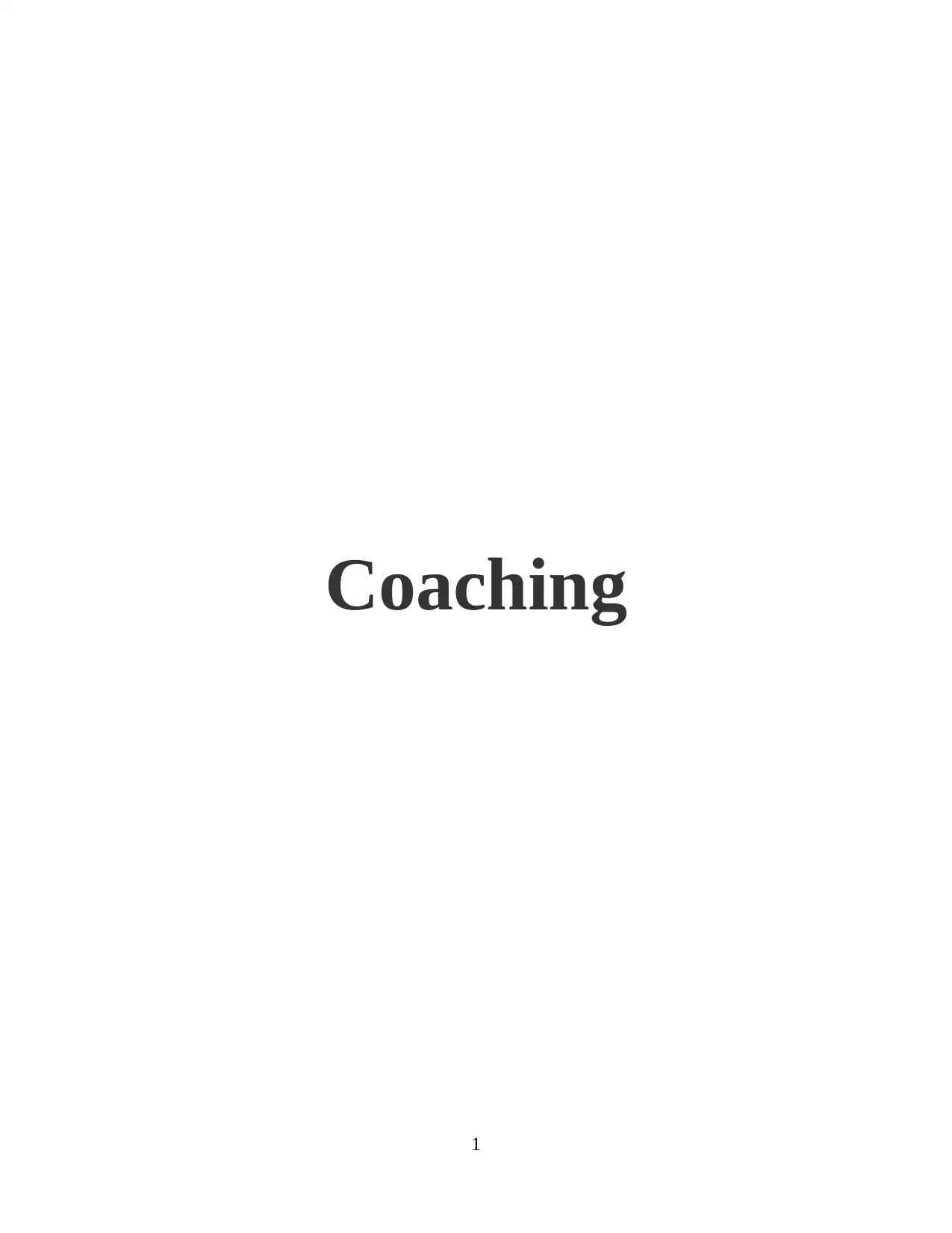
Coaching
1
1
Paraphrase This Document
Need a fresh take? Get an instant paraphrase of this document with our AI Paraphraser
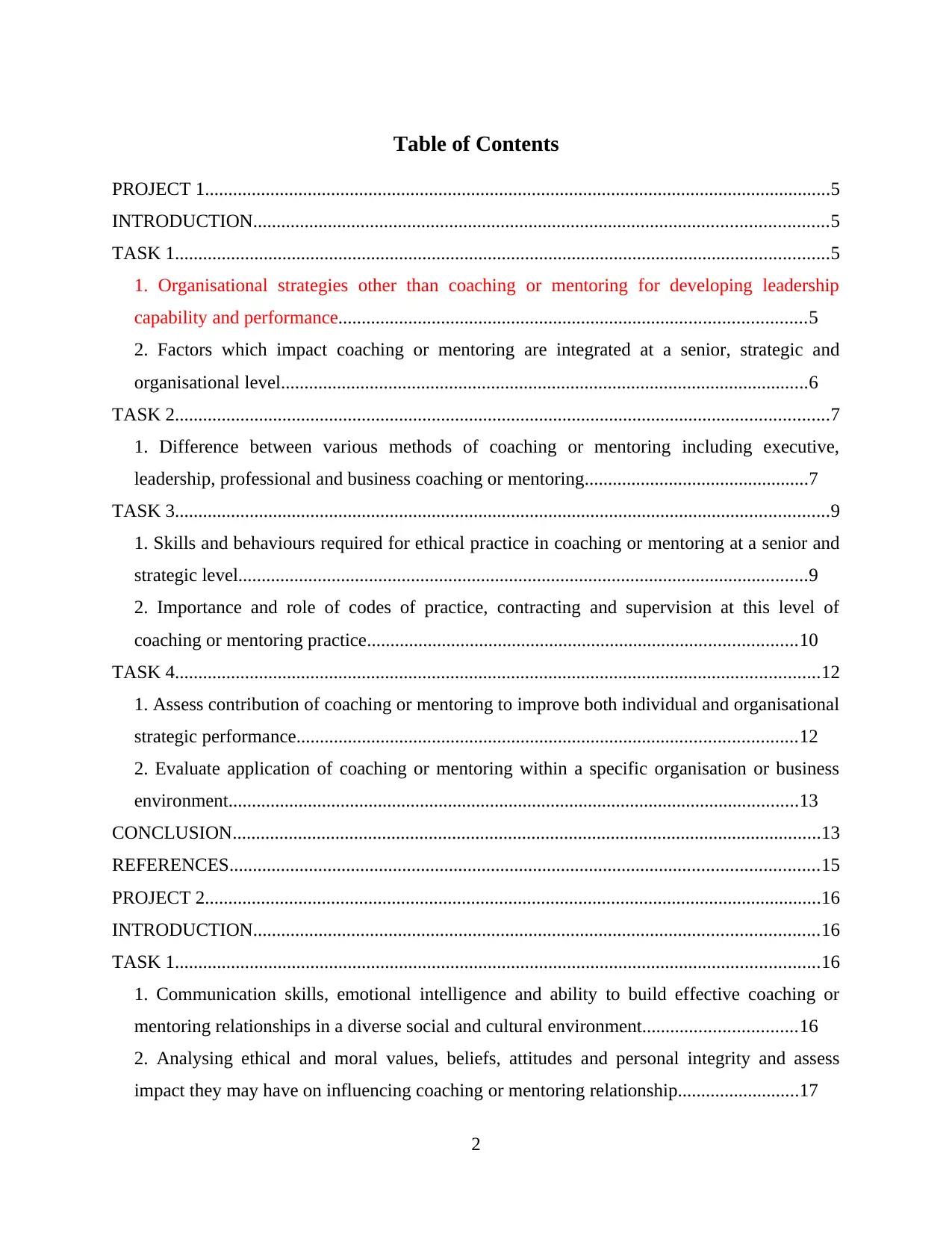
Table of Contents
PROJECT 1......................................................................................................................................5
INTRODUCTION...........................................................................................................................5
TASK 1............................................................................................................................................5
1. Organisational strategies other than coaching or mentoring for developing leadership
capability and performance....................................................................................................5
2. Factors which impact coaching or mentoring are integrated at a senior, strategic and
organisational level.................................................................................................................6
TASK 2............................................................................................................................................7
1. Difference between various methods of coaching or mentoring including executive,
leadership, professional and business coaching or mentoring................................................7
TASK 3............................................................................................................................................9
1. Skills and behaviours required for ethical practice in coaching or mentoring at a senior and
strategic level..........................................................................................................................9
2. Importance and role of codes of practice, contracting and supervision at this level of
coaching or mentoring practice............................................................................................10
TASK 4..........................................................................................................................................12
1. Assess contribution of coaching or mentoring to improve both individual and organisational
strategic performance...........................................................................................................12
2. Evaluate application of coaching or mentoring within a specific organisation or business
environment..........................................................................................................................13
CONCLUSION..............................................................................................................................13
REFERENCES..............................................................................................................................15
PROJECT 2....................................................................................................................................16
INTRODUCTION.........................................................................................................................16
TASK 1..........................................................................................................................................16
1. Communication skills, emotional intelligence and ability to build effective coaching or
mentoring relationships in a diverse social and cultural environment.................................16
2. Analysing ethical and moral values, beliefs, attitudes and personal integrity and assess
impact they may have on influencing coaching or mentoring relationship..........................17
2
PROJECT 1......................................................................................................................................5
INTRODUCTION...........................................................................................................................5
TASK 1............................................................................................................................................5
1. Organisational strategies other than coaching or mentoring for developing leadership
capability and performance....................................................................................................5
2. Factors which impact coaching or mentoring are integrated at a senior, strategic and
organisational level.................................................................................................................6
TASK 2............................................................................................................................................7
1. Difference between various methods of coaching or mentoring including executive,
leadership, professional and business coaching or mentoring................................................7
TASK 3............................................................................................................................................9
1. Skills and behaviours required for ethical practice in coaching or mentoring at a senior and
strategic level..........................................................................................................................9
2. Importance and role of codes of practice, contracting and supervision at this level of
coaching or mentoring practice............................................................................................10
TASK 4..........................................................................................................................................12
1. Assess contribution of coaching or mentoring to improve both individual and organisational
strategic performance...........................................................................................................12
2. Evaluate application of coaching or mentoring within a specific organisation or business
environment..........................................................................................................................13
CONCLUSION..............................................................................................................................13
REFERENCES..............................................................................................................................15
PROJECT 2....................................................................................................................................16
INTRODUCTION.........................................................................................................................16
TASK 1..........................................................................................................................................16
1. Communication skills, emotional intelligence and ability to build effective coaching or
mentoring relationships in a diverse social and cultural environment.................................16
2. Analysing ethical and moral values, beliefs, attitudes and personal integrity and assess
impact they may have on influencing coaching or mentoring relationship..........................17
2
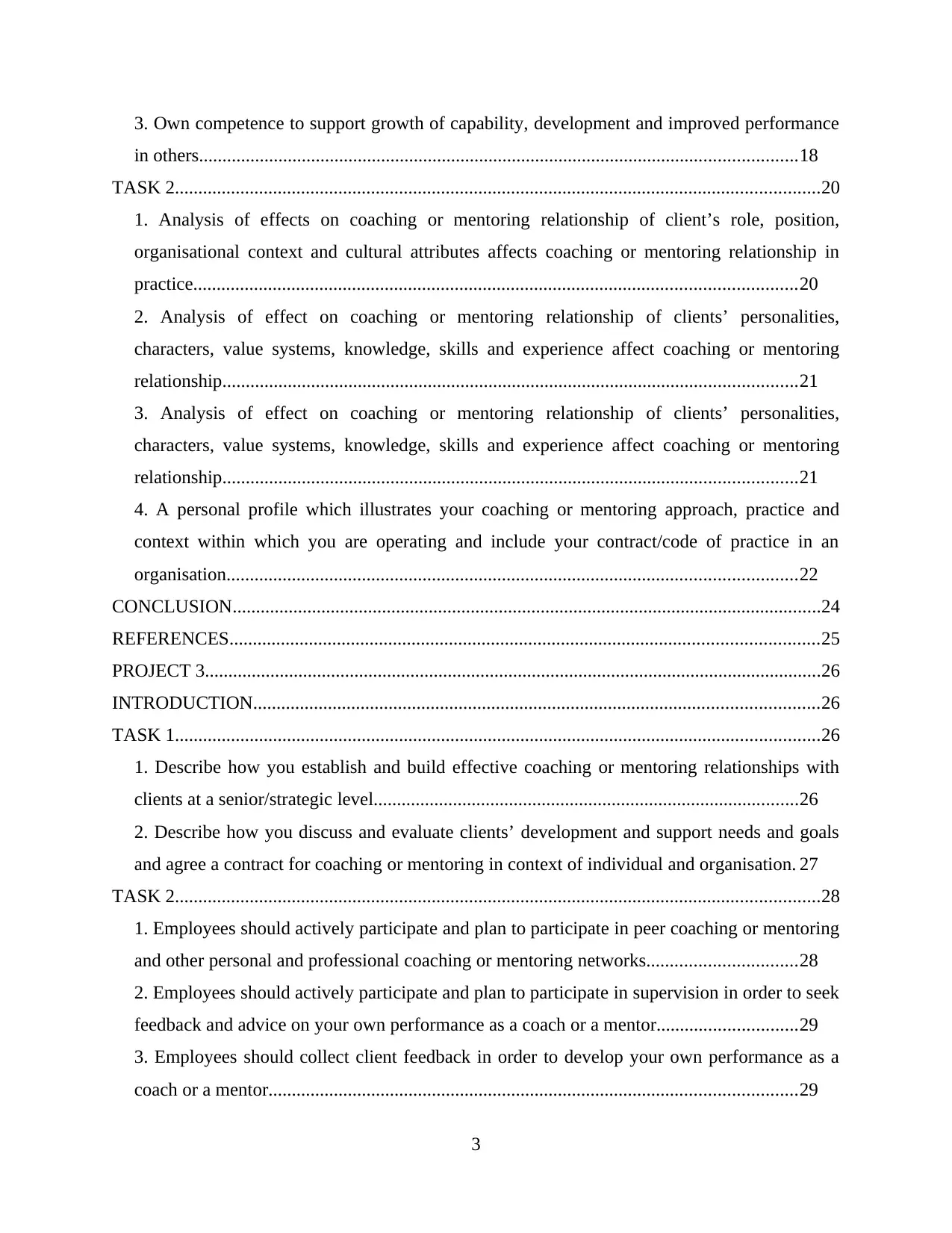
3. Own competence to support growth of capability, development and improved performance
in others................................................................................................................................18
TASK 2..........................................................................................................................................20
1. Analysis of effects on coaching or mentoring relationship of client’s role, position,
organisational context and cultural attributes affects coaching or mentoring relationship in
practice.................................................................................................................................20
2. Analysis of effect on coaching or mentoring relationship of clients’ personalities,
characters, value systems, knowledge, skills and experience affect coaching or mentoring
relationship...........................................................................................................................21
3. Analysis of effect on coaching or mentoring relationship of clients’ personalities,
characters, value systems, knowledge, skills and experience affect coaching or mentoring
relationship...........................................................................................................................21
4. A personal profile which illustrates your coaching or mentoring approach, practice and
context within which you are operating and include your contract/code of practice in an
organisation..........................................................................................................................22
CONCLUSION..............................................................................................................................24
REFERENCES..............................................................................................................................25
PROJECT 3....................................................................................................................................26
INTRODUCTION.........................................................................................................................26
TASK 1..........................................................................................................................................26
1. Describe how you establish and build effective coaching or mentoring relationships with
clients at a senior/strategic level...........................................................................................26
2. Describe how you discuss and evaluate clients’ development and support needs and goals
and agree a contract for coaching or mentoring in context of individual and organisation. 27
TASK 2..........................................................................................................................................28
1. Employees should actively participate and plan to participate in peer coaching or mentoring
and other personal and professional coaching or mentoring networks................................28
2. Employees should actively participate and plan to participate in supervision in order to seek
feedback and advice on your own performance as a coach or a mentor..............................29
3. Employees should collect client feedback in order to develop your own performance as a
coach or a mentor.................................................................................................................29
3
in others................................................................................................................................18
TASK 2..........................................................................................................................................20
1. Analysis of effects on coaching or mentoring relationship of client’s role, position,
organisational context and cultural attributes affects coaching or mentoring relationship in
practice.................................................................................................................................20
2. Analysis of effect on coaching or mentoring relationship of clients’ personalities,
characters, value systems, knowledge, skills and experience affect coaching or mentoring
relationship...........................................................................................................................21
3. Analysis of effect on coaching or mentoring relationship of clients’ personalities,
characters, value systems, knowledge, skills and experience affect coaching or mentoring
relationship...........................................................................................................................21
4. A personal profile which illustrates your coaching or mentoring approach, practice and
context within which you are operating and include your contract/code of practice in an
organisation..........................................................................................................................22
CONCLUSION..............................................................................................................................24
REFERENCES..............................................................................................................................25
PROJECT 3....................................................................................................................................26
INTRODUCTION.........................................................................................................................26
TASK 1..........................................................................................................................................26
1. Describe how you establish and build effective coaching or mentoring relationships with
clients at a senior/strategic level...........................................................................................26
2. Describe how you discuss and evaluate clients’ development and support needs and goals
and agree a contract for coaching or mentoring in context of individual and organisation. 27
TASK 2..........................................................................................................................................28
1. Employees should actively participate and plan to participate in peer coaching or mentoring
and other personal and professional coaching or mentoring networks................................28
2. Employees should actively participate and plan to participate in supervision in order to seek
feedback and advice on your own performance as a coach or a mentor..............................29
3. Employees should collect client feedback in order to develop your own performance as a
coach or a mentor.................................................................................................................29
3
⊘ This is a preview!⊘
Do you want full access?
Subscribe today to unlock all pages.

Trusted by 1+ million students worldwide
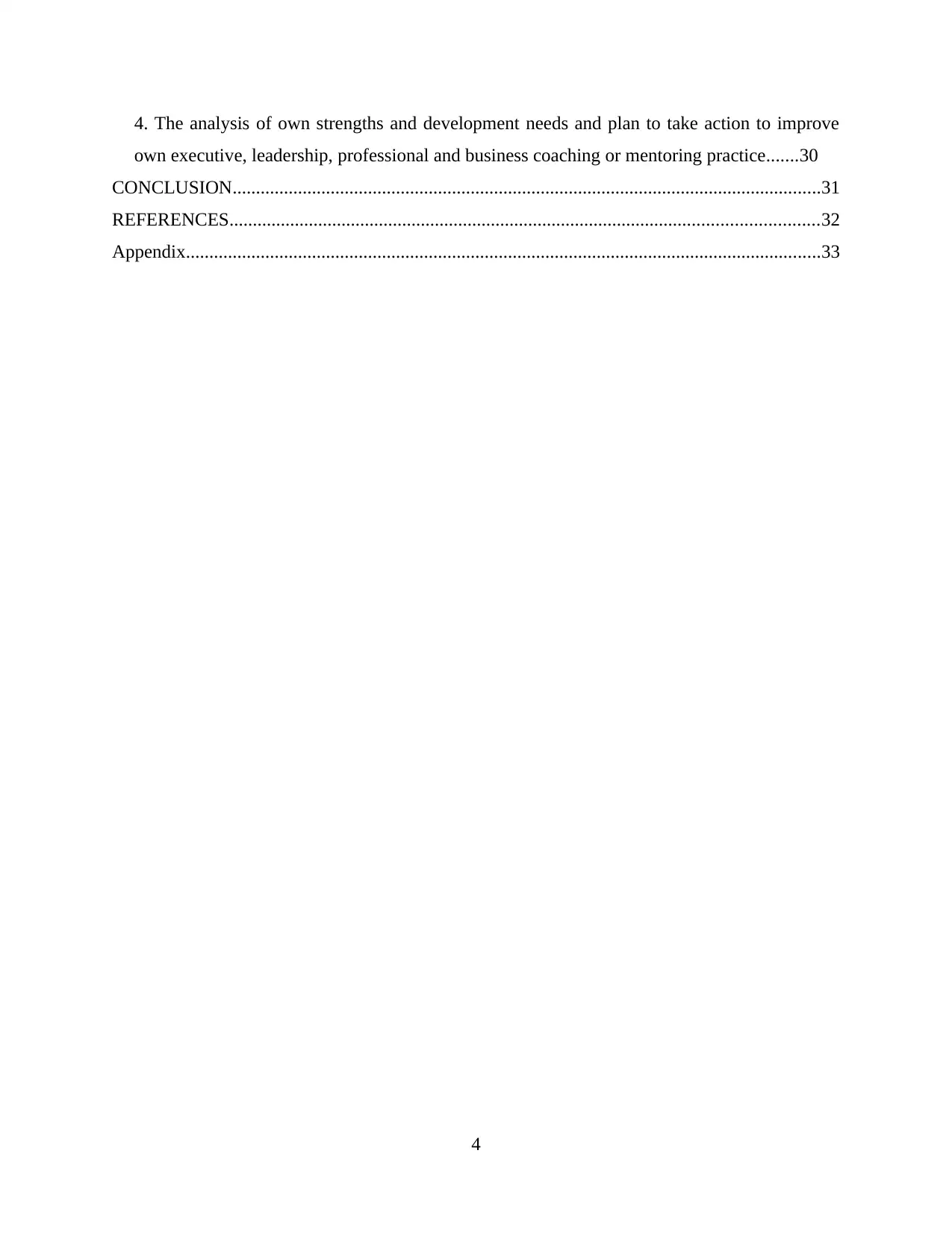
4. The analysis of own strengths and development needs and plan to take action to improve
own executive, leadership, professional and business coaching or mentoring practice.......30
CONCLUSION..............................................................................................................................31
REFERENCES..............................................................................................................................32
Appendix........................................................................................................................................33
4
own executive, leadership, professional and business coaching or mentoring practice.......30
CONCLUSION..............................................................................................................................31
REFERENCES..............................................................................................................................32
Appendix........................................................................................................................................33
4
Paraphrase This Document
Need a fresh take? Get an instant paraphrase of this document with our AI Paraphraser
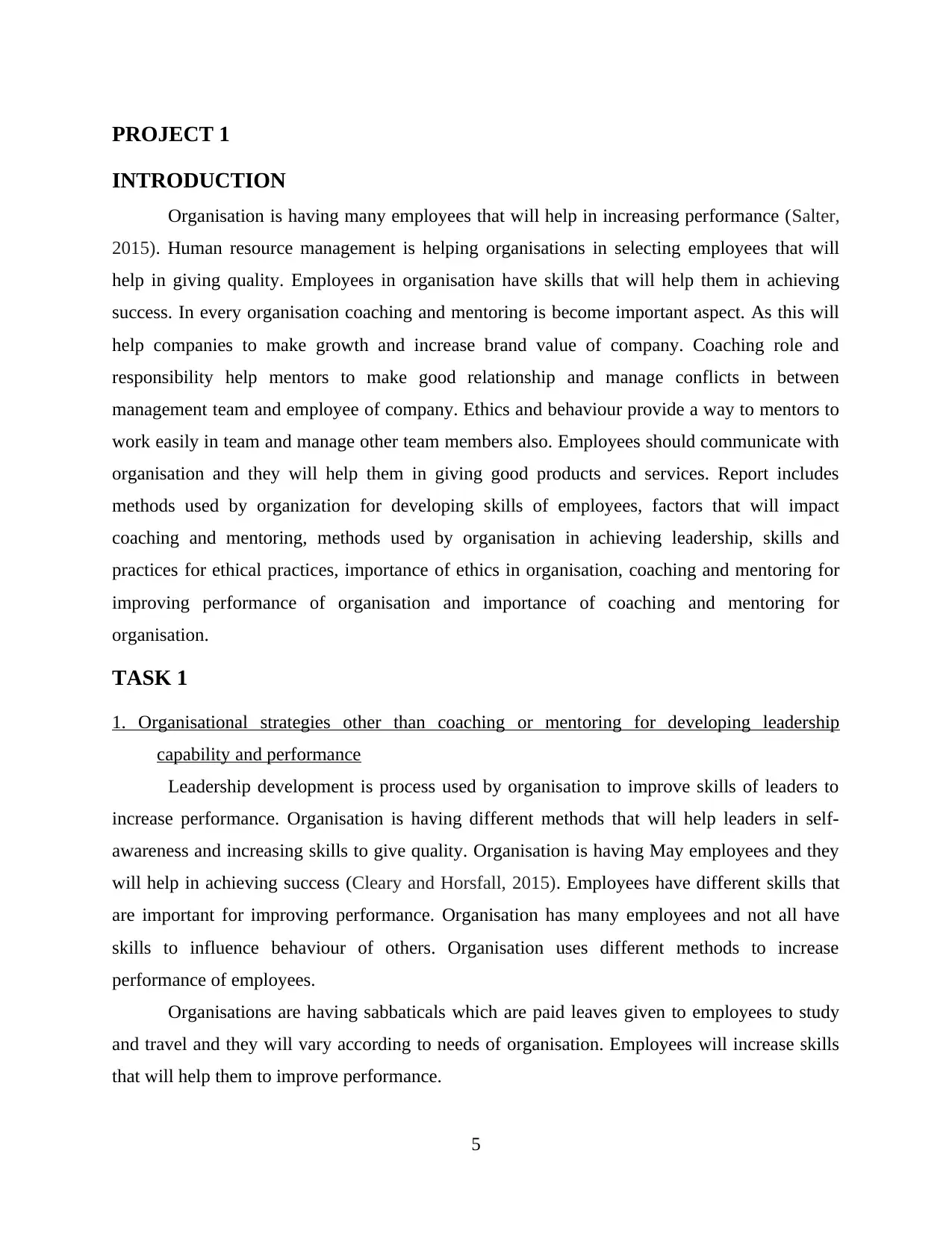
PROJECT 1
INTRODUCTION
Organisation is having many employees that will help in increasing performance (Salter,
2015). Human resource management is helping organisations in selecting employees that will
help in giving quality. Employees in organisation have skills that will help them in achieving
success. In every organisation coaching and mentoring is become important aspect. As this will
help companies to make growth and increase brand value of company. Coaching role and
responsibility help mentors to make good relationship and manage conflicts in between
management team and employee of company. Ethics and behaviour provide a way to mentors to
work easily in team and manage other team members also. Employees should communicate with
organisation and they will help them in giving good products and services. Report includes
methods used by organization for developing skills of employees, factors that will impact
coaching and mentoring, methods used by organisation in achieving leadership, skills and
practices for ethical practices, importance of ethics in organisation, coaching and mentoring for
improving performance of organisation and importance of coaching and mentoring for
organisation.
TASK 1
1. Organisational strategies other than coaching or mentoring for developing leadership
capability and performance
Leadership development is process used by organisation to improve skills of leaders to
increase performance. Organisation is having different methods that will help leaders in self-
awareness and increasing skills to give quality. Organisation is having May employees and they
will help in achieving success (Cleary and Horsfall, 2015). Employees have different skills that
are important for improving performance. Organisation has many employees and not all have
skills to influence behaviour of others. Organisation uses different methods to increase
performance of employees.
Organisations are having sabbaticals which are paid leaves given to employees to study
and travel and they will vary according to needs of organisation. Employees will increase skills
that will help them to improve performance.
5
INTRODUCTION
Organisation is having many employees that will help in increasing performance (Salter,
2015). Human resource management is helping organisations in selecting employees that will
help in giving quality. Employees in organisation have skills that will help them in achieving
success. In every organisation coaching and mentoring is become important aspect. As this will
help companies to make growth and increase brand value of company. Coaching role and
responsibility help mentors to make good relationship and manage conflicts in between
management team and employee of company. Ethics and behaviour provide a way to mentors to
work easily in team and manage other team members also. Employees should communicate with
organisation and they will help them in giving good products and services. Report includes
methods used by organization for developing skills of employees, factors that will impact
coaching and mentoring, methods used by organisation in achieving leadership, skills and
practices for ethical practices, importance of ethics in organisation, coaching and mentoring for
improving performance of organisation and importance of coaching and mentoring for
organisation.
TASK 1
1. Organisational strategies other than coaching or mentoring for developing leadership
capability and performance
Leadership development is process used by organisation to improve skills of leaders to
increase performance. Organisation is having different methods that will help leaders in self-
awareness and increasing skills to give quality. Organisation is having May employees and they
will help in achieving success (Cleary and Horsfall, 2015). Employees have different skills that
are important for improving performance. Organisation has many employees and not all have
skills to influence behaviour of others. Organisation uses different methods to increase
performance of employees.
Organisations are having sabbaticals which are paid leaves given to employees to study
and travel and they will vary according to needs of organisation. Employees will increase skills
that will help them to improve performance.
5
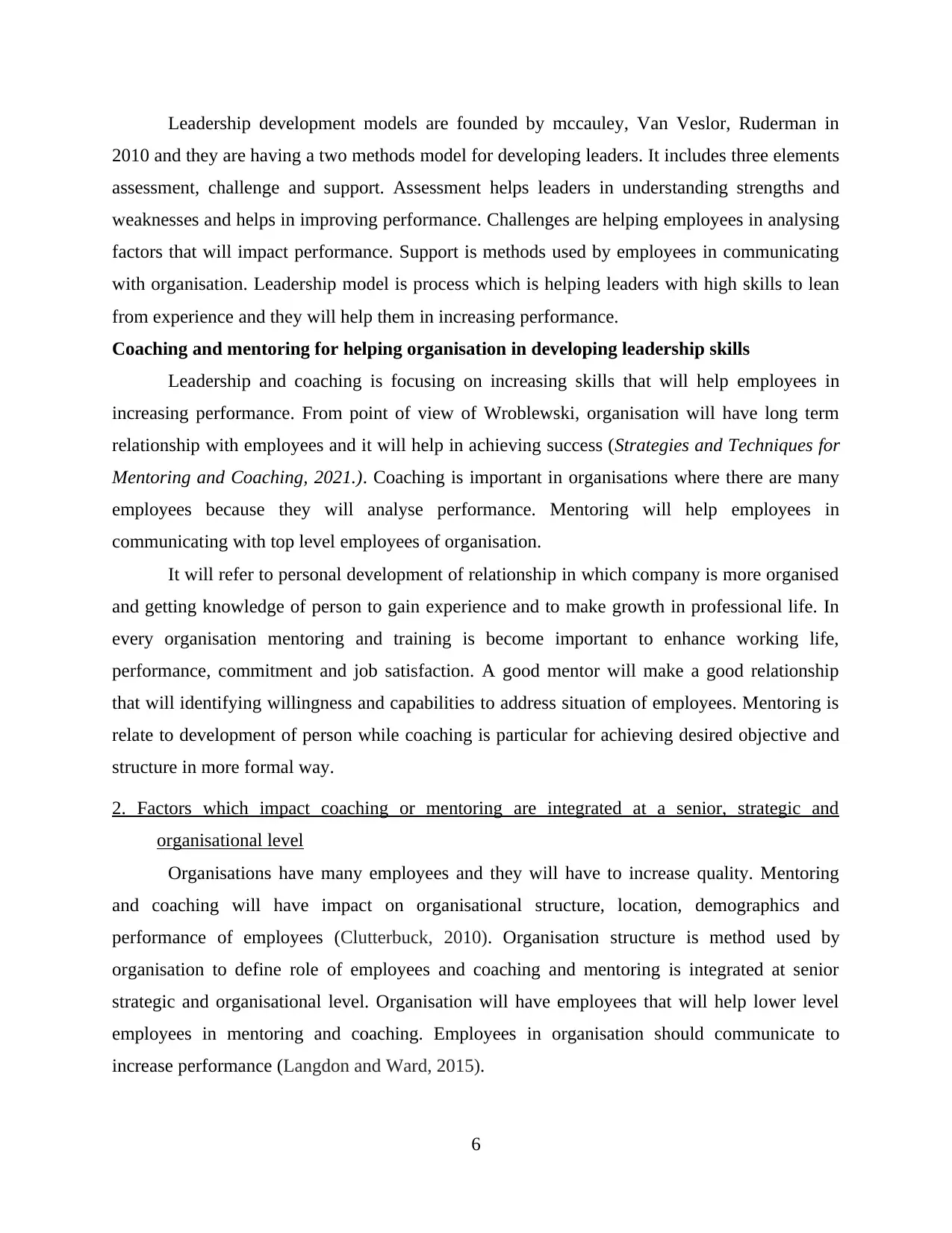
Leadership development models are founded by mccauley, Van Veslor, Ruderman in
2010 and they are having a two methods model for developing leaders. It includes three elements
assessment, challenge and support. Assessment helps leaders in understanding strengths and
weaknesses and helps in improving performance. Challenges are helping employees in analysing
factors that will impact performance. Support is methods used by employees in communicating
with organisation. Leadership model is process which is helping leaders with high skills to lean
from experience and they will help them in increasing performance.
Coaching and mentoring for helping organisation in developing leadership skills
Leadership and coaching is focusing on increasing skills that will help employees in
increasing performance. From point of view of Wroblewski, organisation will have long term
relationship with employees and it will help in achieving success (Strategies and Techniques for
Mentoring and Coaching, 2021.). Coaching is important in organisations where there are many
employees because they will analyse performance. Mentoring will help employees in
communicating with top level employees of organisation.
It will refer to personal development of relationship in which company is more organised
and getting knowledge of person to gain experience and to make growth in professional life. In
every organisation mentoring and training is become important to enhance working life,
performance, commitment and job satisfaction. A good mentor will make a good relationship
that will identifying willingness and capabilities to address situation of employees. Mentoring is
relate to development of person while coaching is particular for achieving desired objective and
structure in more formal way.
2. Factors which impact coaching or mentoring are integrated at a senior, strategic and
organisational level
Organisations have many employees and they will have to increase quality. Mentoring
and coaching will have impact on organisational structure, location, demographics and
performance of employees (Clutterbuck, 2010). Organisation structure is method used by
organisation to define role of employees and coaching and mentoring is integrated at senior
strategic and organisational level. Organisation will have employees that will help lower level
employees in mentoring and coaching. Employees in organisation should communicate to
increase performance (Langdon and Ward, 2015).
6
2010 and they are having a two methods model for developing leaders. It includes three elements
assessment, challenge and support. Assessment helps leaders in understanding strengths and
weaknesses and helps in improving performance. Challenges are helping employees in analysing
factors that will impact performance. Support is methods used by employees in communicating
with organisation. Leadership model is process which is helping leaders with high skills to lean
from experience and they will help them in increasing performance.
Coaching and mentoring for helping organisation in developing leadership skills
Leadership and coaching is focusing on increasing skills that will help employees in
increasing performance. From point of view of Wroblewski, organisation will have long term
relationship with employees and it will help in achieving success (Strategies and Techniques for
Mentoring and Coaching, 2021.). Coaching is important in organisations where there are many
employees because they will analyse performance. Mentoring will help employees in
communicating with top level employees of organisation.
It will refer to personal development of relationship in which company is more organised
and getting knowledge of person to gain experience and to make growth in professional life. In
every organisation mentoring and training is become important to enhance working life,
performance, commitment and job satisfaction. A good mentor will make a good relationship
that will identifying willingness and capabilities to address situation of employees. Mentoring is
relate to development of person while coaching is particular for achieving desired objective and
structure in more formal way.
2. Factors which impact coaching or mentoring are integrated at a senior, strategic and
organisational level
Organisations have many employees and they will have to increase quality. Mentoring
and coaching will have impact on organisational structure, location, demographics and
performance of employees (Clutterbuck, 2010). Organisation structure is method used by
organisation to define role of employees and coaching and mentoring is integrated at senior
strategic and organisational level. Organisation will have employees that will help lower level
employees in mentoring and coaching. Employees in organisation should communicate to
increase performance (Langdon and Ward, 2015).
6
⊘ This is a preview!⊘
Do you want full access?
Subscribe today to unlock all pages.

Trusted by 1+ million students worldwide
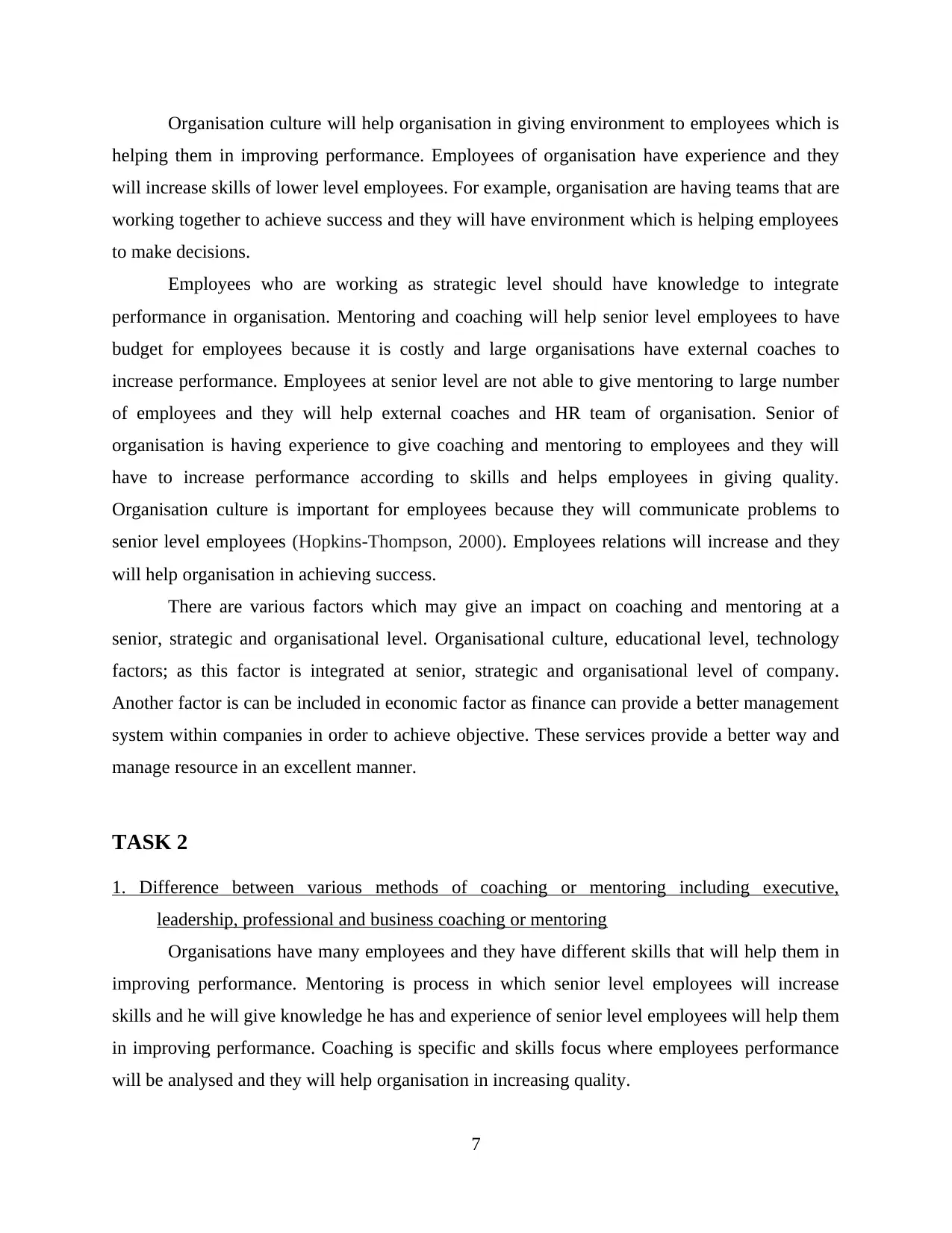
Organisation culture will help organisation in giving environment to employees which is
helping them in improving performance. Employees of organisation have experience and they
will increase skills of lower level employees. For example, organisation are having teams that are
working together to achieve success and they will have environment which is helping employees
to make decisions.
Employees who are working as strategic level should have knowledge to integrate
performance in organisation. Mentoring and coaching will help senior level employees to have
budget for employees because it is costly and large organisations have external coaches to
increase performance. Employees at senior level are not able to give mentoring to large number
of employees and they will help external coaches and HR team of organisation. Senior of
organisation is having experience to give coaching and mentoring to employees and they will
have to increase performance according to skills and helps employees in giving quality.
Organisation culture is important for employees because they will communicate problems to
senior level employees (Hopkins-Thompson, 2000). Employees relations will increase and they
will help organisation in achieving success.
There are various factors which may give an impact on coaching and mentoring at a
senior, strategic and organisational level. Organisational culture, educational level, technology
factors; as this factor is integrated at senior, strategic and organisational level of company.
Another factor is can be included in economic factor as finance can provide a better management
system within companies in order to achieve objective. These services provide a better way and
manage resource in an excellent manner.
TASK 2
1. Difference between various methods of coaching or mentoring including executive,
leadership, professional and business coaching or mentoring
Organisations have many employees and they have different skills that will help them in
improving performance. Mentoring is process in which senior level employees will increase
skills and he will give knowledge he has and experience of senior level employees will help them
in improving performance. Coaching is specific and skills focus where employees performance
will be analysed and they will help organisation in increasing quality.
7
helping them in improving performance. Employees of organisation have experience and they
will increase skills of lower level employees. For example, organisation are having teams that are
working together to achieve success and they will have environment which is helping employees
to make decisions.
Employees who are working as strategic level should have knowledge to integrate
performance in organisation. Mentoring and coaching will help senior level employees to have
budget for employees because it is costly and large organisations have external coaches to
increase performance. Employees at senior level are not able to give mentoring to large number
of employees and they will help external coaches and HR team of organisation. Senior of
organisation is having experience to give coaching and mentoring to employees and they will
have to increase performance according to skills and helps employees in giving quality.
Organisation culture is important for employees because they will communicate problems to
senior level employees (Hopkins-Thompson, 2000). Employees relations will increase and they
will help organisation in achieving success.
There are various factors which may give an impact on coaching and mentoring at a
senior, strategic and organisational level. Organisational culture, educational level, technology
factors; as this factor is integrated at senior, strategic and organisational level of company.
Another factor is can be included in economic factor as finance can provide a better management
system within companies in order to achieve objective. These services provide a better way and
manage resource in an excellent manner.
TASK 2
1. Difference between various methods of coaching or mentoring including executive,
leadership, professional and business coaching or mentoring
Organisations have many employees and they have different skills that will help them in
improving performance. Mentoring is process in which senior level employees will increase
skills and he will give knowledge he has and experience of senior level employees will help them
in improving performance. Coaching is specific and skills focus where employees performance
will be analysed and they will help organisation in increasing quality.
7
Paraphrase This Document
Need a fresh take? Get an instant paraphrase of this document with our AI Paraphraser
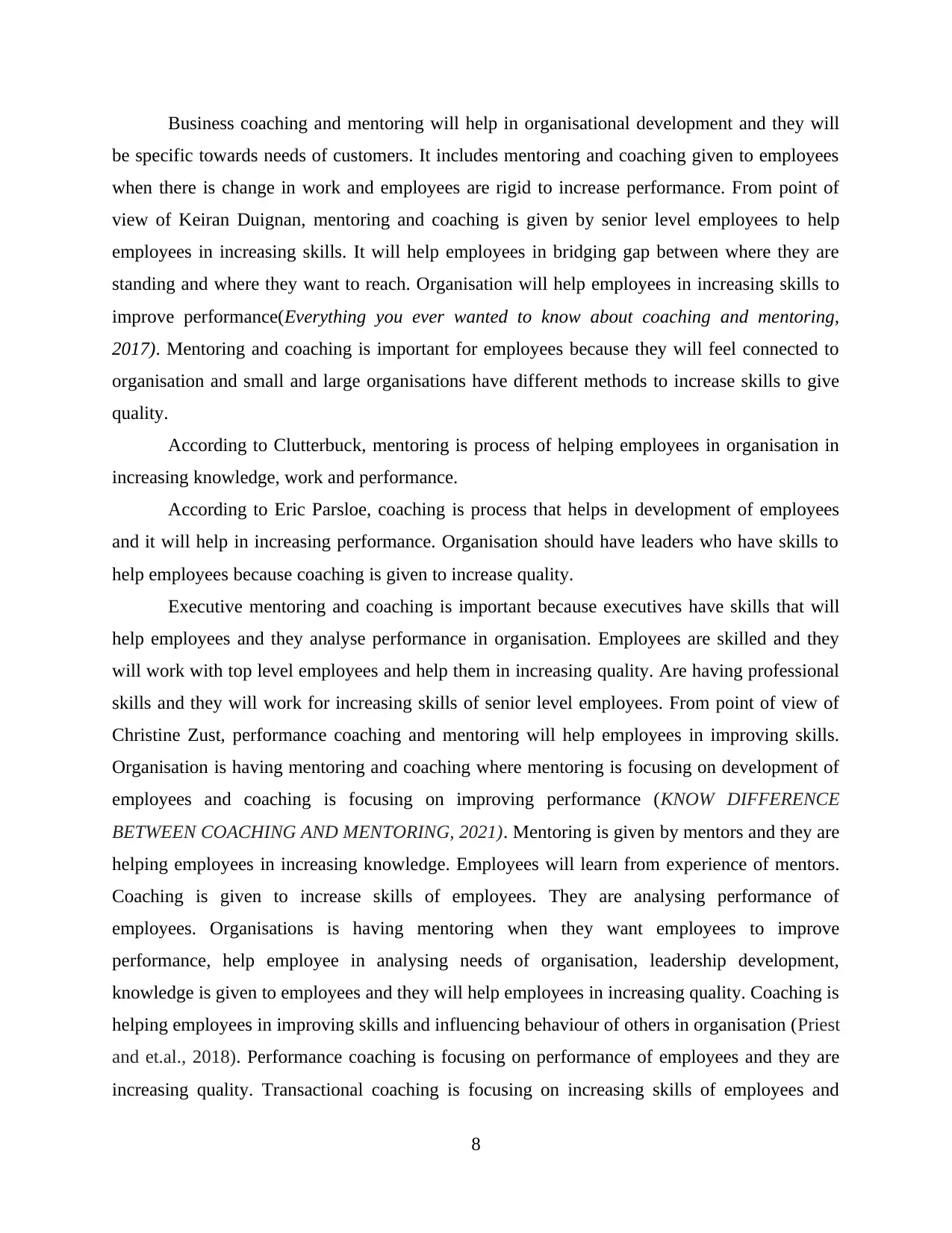
Business coaching and mentoring will help in organisational development and they will
be specific towards needs of customers. It includes mentoring and coaching given to employees
when there is change in work and employees are rigid to increase performance. From point of
view of Keiran Duignan, mentoring and coaching is given by senior level employees to help
employees in increasing skills. It will help employees in bridging gap between where they are
standing and where they want to reach. Organisation will help employees in increasing skills to
improve performance(Everything you ever wanted to know about coaching and mentoring,
2017). Mentoring and coaching is important for employees because they will feel connected to
organisation and small and large organisations have different methods to increase skills to give
quality.
According to Clutterbuck, mentoring is process of helping employees in organisation in
increasing knowledge, work and performance.
According to Eric Parsloe, coaching is process that helps in development of employees
and it will help in increasing performance. Organisation should have leaders who have skills to
help employees because coaching is given to increase quality.
Executive mentoring and coaching is important because executives have skills that will
help employees and they analyse performance in organisation. Employees are skilled and they
will work with top level employees and help them in increasing quality. Are having professional
skills and they will work for increasing skills of senior level employees. From point of view of
Christine Zust, performance coaching and mentoring will help employees in improving skills.
Organisation is having mentoring and coaching where mentoring is focusing on development of
employees and coaching is focusing on improving performance (KNOW DIFFERENCE
BETWEEN COACHING AND MENTORING, 2021). Mentoring is given by mentors and they are
helping employees in increasing knowledge. Employees will learn from experience of mentors.
Coaching is given to increase skills of employees. They are analysing performance of
employees. Organisations is having mentoring when they want employees to improve
performance, help employee in analysing needs of organisation, leadership development,
knowledge is given to employees and they will help employees in increasing quality. Coaching is
helping employees in improving skills and influencing behaviour of others in organisation (Priest
and et.al., 2018). Performance coaching is focusing on performance of employees and they are
increasing quality. Transactional coaching is focusing on increasing skills of employees and
8
be specific towards needs of customers. It includes mentoring and coaching given to employees
when there is change in work and employees are rigid to increase performance. From point of
view of Keiran Duignan, mentoring and coaching is given by senior level employees to help
employees in increasing skills. It will help employees in bridging gap between where they are
standing and where they want to reach. Organisation will help employees in increasing skills to
improve performance(Everything you ever wanted to know about coaching and mentoring,
2017). Mentoring and coaching is important for employees because they will feel connected to
organisation and small and large organisations have different methods to increase skills to give
quality.
According to Clutterbuck, mentoring is process of helping employees in organisation in
increasing knowledge, work and performance.
According to Eric Parsloe, coaching is process that helps in development of employees
and it will help in increasing performance. Organisation should have leaders who have skills to
help employees because coaching is given to increase quality.
Executive mentoring and coaching is important because executives have skills that will
help employees and they analyse performance in organisation. Employees are skilled and they
will work with top level employees and help them in increasing quality. Are having professional
skills and they will work for increasing skills of senior level employees. From point of view of
Christine Zust, performance coaching and mentoring will help employees in improving skills.
Organisation is having mentoring and coaching where mentoring is focusing on development of
employees and coaching is focusing on improving performance (KNOW DIFFERENCE
BETWEEN COACHING AND MENTORING, 2021). Mentoring is given by mentors and they are
helping employees in increasing knowledge. Employees will learn from experience of mentors.
Coaching is given to increase skills of employees. They are analysing performance of
employees. Organisations is having mentoring when they want employees to improve
performance, help employee in analysing needs of organisation, leadership development,
knowledge is given to employees and they will help employees in increasing quality. Coaching is
helping employees in improving skills and influencing behaviour of others in organisation (Priest
and et.al., 2018). Performance coaching is focusing on performance of employees and they are
increasing quality. Transactional coaching is focusing on increasing skills of employees and
8
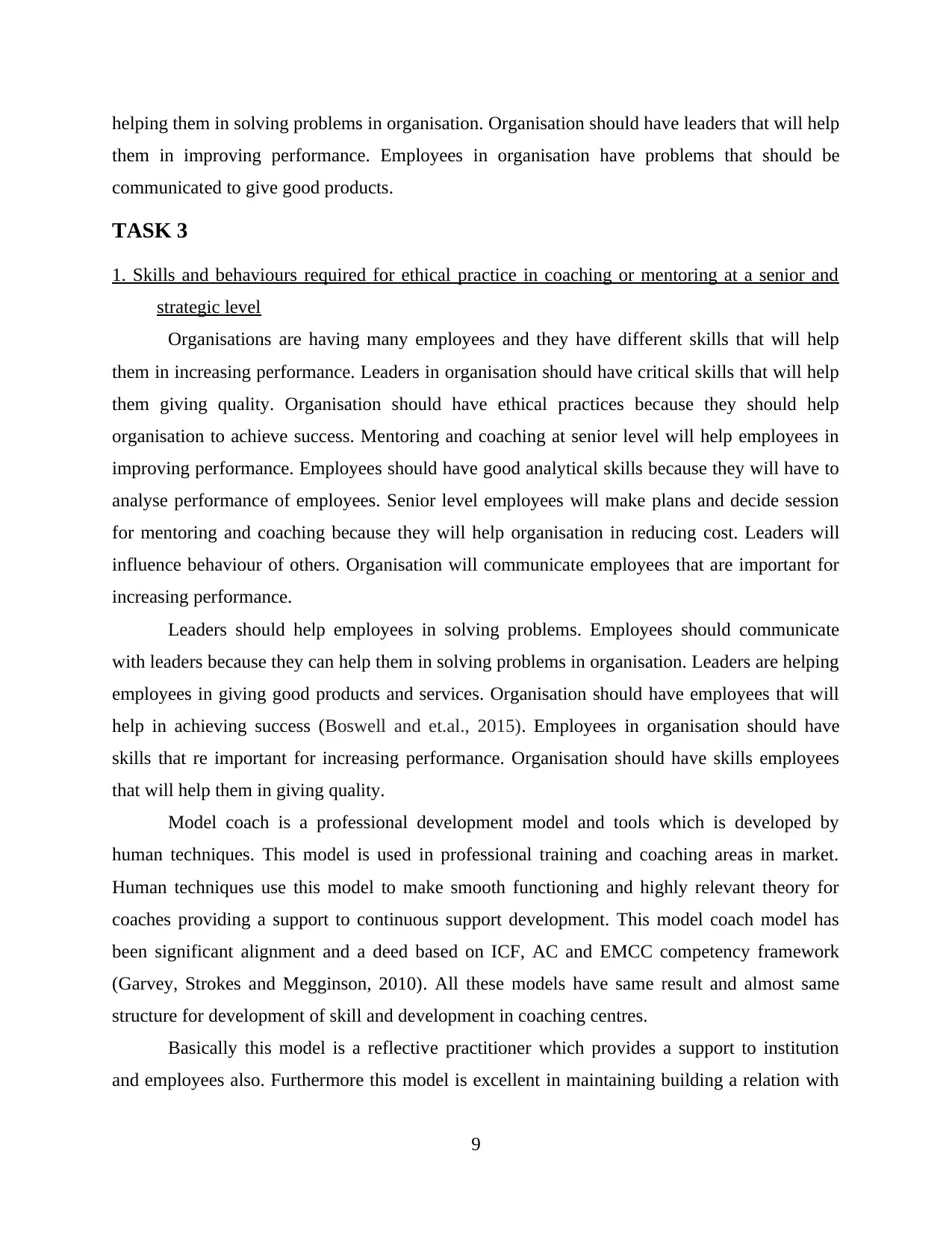
helping them in solving problems in organisation. Organisation should have leaders that will help
them in improving performance. Employees in organisation have problems that should be
communicated to give good products.
TASK 3
1. Skills and behaviours required for ethical practice in coaching or mentoring at a senior and
strategic level
Organisations are having many employees and they have different skills that will help
them in increasing performance. Leaders in organisation should have critical skills that will help
them giving quality. Organisation should have ethical practices because they should help
organisation to achieve success. Mentoring and coaching at senior level will help employees in
improving performance. Employees should have good analytical skills because they will have to
analyse performance of employees. Senior level employees will make plans and decide session
for mentoring and coaching because they will help organisation in reducing cost. Leaders will
influence behaviour of others. Organisation will communicate employees that are important for
increasing performance.
Leaders should help employees in solving problems. Employees should communicate
with leaders because they can help them in solving problems in organisation. Leaders are helping
employees in giving good products and services. Organisation should have employees that will
help in achieving success (Boswell and et.al., 2015). Employees in organisation should have
skills that re important for increasing performance. Organisation should have skills employees
that will help them in giving quality.
Model coach is a professional development model and tools which is developed by
human techniques. This model is used in professional training and coaching areas in market.
Human techniques use this model to make smooth functioning and highly relevant theory for
coaches providing a support to continuous support development. This model coach model has
been significant alignment and a deed based on ICF, AC and EMCC competency framework
(Garvey, Strokes and Megginson, 2010). All these models have same result and almost same
structure for development of skill and development in coaching centres.
Basically this model is a reflective practitioner which provides a support to institution
and employees also. Furthermore this model is excellent in maintaining building a relation with
9
them in improving performance. Employees in organisation have problems that should be
communicated to give good products.
TASK 3
1. Skills and behaviours required for ethical practice in coaching or mentoring at a senior and
strategic level
Organisations are having many employees and they have different skills that will help
them in increasing performance. Leaders in organisation should have critical skills that will help
them giving quality. Organisation should have ethical practices because they should help
organisation to achieve success. Mentoring and coaching at senior level will help employees in
improving performance. Employees should have good analytical skills because they will have to
analyse performance of employees. Senior level employees will make plans and decide session
for mentoring and coaching because they will help organisation in reducing cost. Leaders will
influence behaviour of others. Organisation will communicate employees that are important for
increasing performance.
Leaders should help employees in solving problems. Employees should communicate
with leaders because they can help them in solving problems in organisation. Leaders are helping
employees in giving good products and services. Organisation should have employees that will
help in achieving success (Boswell and et.al., 2015). Employees in organisation should have
skills that re important for increasing performance. Organisation should have skills employees
that will help them in giving quality.
Model coach is a professional development model and tools which is developed by
human techniques. This model is used in professional training and coaching areas in market.
Human techniques use this model to make smooth functioning and highly relevant theory for
coaches providing a support to continuous support development. This model coach model has
been significant alignment and a deed based on ICF, AC and EMCC competency framework
(Garvey, Strokes and Megginson, 2010). All these models have same result and almost same
structure for development of skill and development in coaching centres.
Basically this model is a reflective practitioner which provides a support to institution
and employees also. Furthermore this model is excellent in maintaining building a relation with
9
⊘ This is a preview!⊘
Do you want full access?
Subscribe today to unlock all pages.

Trusted by 1+ million students worldwide
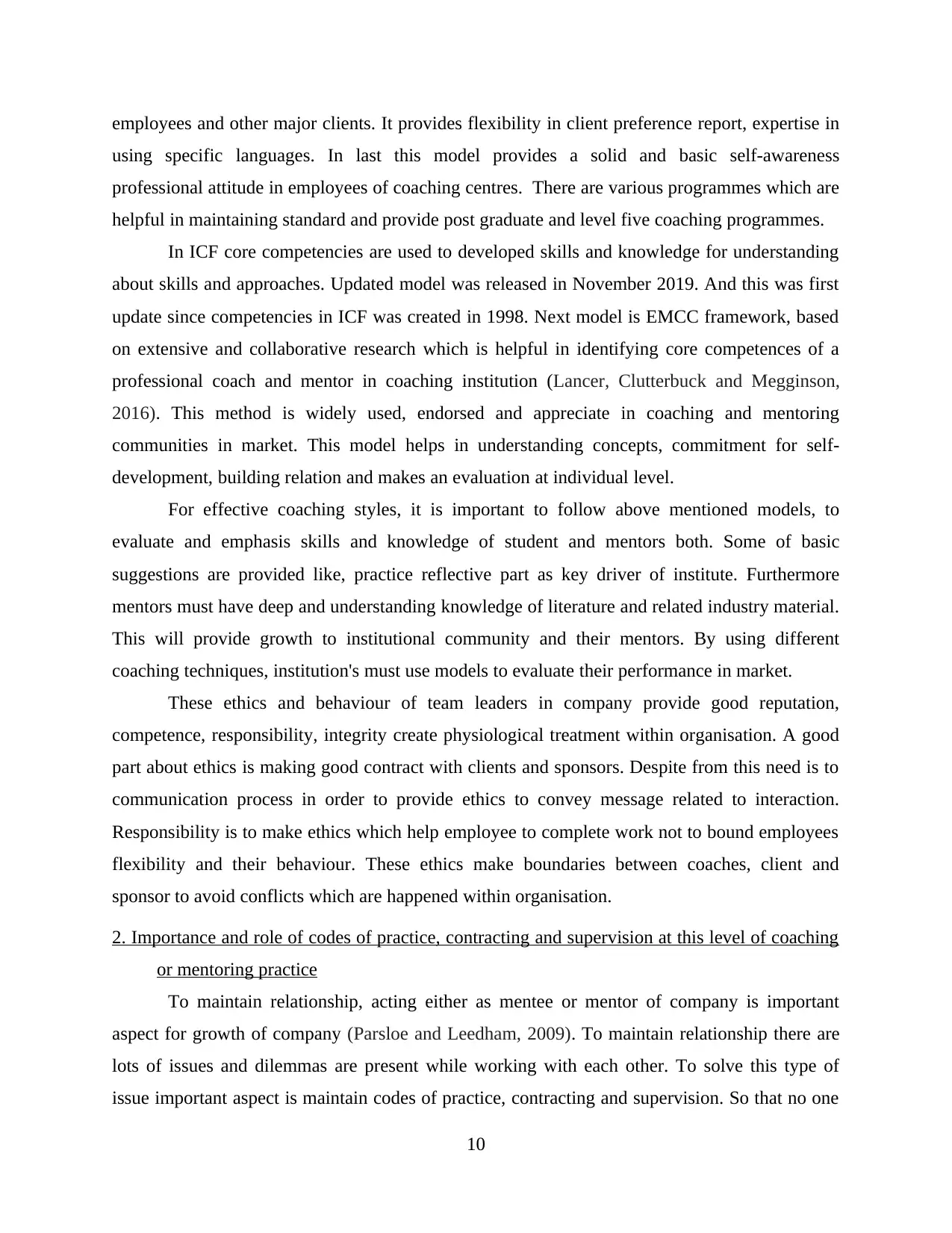
employees and other major clients. It provides flexibility in client preference report, expertise in
using specific languages. In last this model provides a solid and basic self-awareness
professional attitude in employees of coaching centres. There are various programmes which are
helpful in maintaining standard and provide post graduate and level five coaching programmes.
In ICF core competencies are used to developed skills and knowledge for understanding
about skills and approaches. Updated model was released in November 2019. And this was first
update since competencies in ICF was created in 1998. Next model is EMCC framework, based
on extensive and collaborative research which is helpful in identifying core competences of a
professional coach and mentor in coaching institution (Lancer, Clutterbuck and Megginson,
2016). This method is widely used, endorsed and appreciate in coaching and mentoring
communities in market. This model helps in understanding concepts, commitment for self-
development, building relation and makes an evaluation at individual level.
For effective coaching styles, it is important to follow above mentioned models, to
evaluate and emphasis skills and knowledge of student and mentors both. Some of basic
suggestions are provided like, practice reflective part as key driver of institute. Furthermore
mentors must have deep and understanding knowledge of literature and related industry material.
This will provide growth to institutional community and their mentors. By using different
coaching techniques, institution's must use models to evaluate their performance in market.
These ethics and behaviour of team leaders in company provide good reputation,
competence, responsibility, integrity create physiological treatment within organisation. A good
part about ethics is making good contract with clients and sponsors. Despite from this need is to
communication process in order to provide ethics to convey message related to interaction.
Responsibility is to make ethics which help employee to complete work not to bound employees
flexibility and their behaviour. These ethics make boundaries between coaches, client and
sponsor to avoid conflicts which are happened within organisation.
2. Importance and role of codes of practice, contracting and supervision at this level of coaching
or mentoring practice
To maintain relationship, acting either as mentee or mentor of company is important
aspect for growth of company (Parsloe and Leedham, 2009). To maintain relationship there are
lots of issues and dilemmas are present while working with each other. To solve this type of
issue important aspect is maintain codes of practice, contracting and supervision. So that no one
10
using specific languages. In last this model provides a solid and basic self-awareness
professional attitude in employees of coaching centres. There are various programmes which are
helpful in maintaining standard and provide post graduate and level five coaching programmes.
In ICF core competencies are used to developed skills and knowledge for understanding
about skills and approaches. Updated model was released in November 2019. And this was first
update since competencies in ICF was created in 1998. Next model is EMCC framework, based
on extensive and collaborative research which is helpful in identifying core competences of a
professional coach and mentor in coaching institution (Lancer, Clutterbuck and Megginson,
2016). This method is widely used, endorsed and appreciate in coaching and mentoring
communities in market. This model helps in understanding concepts, commitment for self-
development, building relation and makes an evaluation at individual level.
For effective coaching styles, it is important to follow above mentioned models, to
evaluate and emphasis skills and knowledge of student and mentors both. Some of basic
suggestions are provided like, practice reflective part as key driver of institute. Furthermore
mentors must have deep and understanding knowledge of literature and related industry material.
This will provide growth to institutional community and their mentors. By using different
coaching techniques, institution's must use models to evaluate their performance in market.
These ethics and behaviour of team leaders in company provide good reputation,
competence, responsibility, integrity create physiological treatment within organisation. A good
part about ethics is making good contract with clients and sponsors. Despite from this need is to
communication process in order to provide ethics to convey message related to interaction.
Responsibility is to make ethics which help employee to complete work not to bound employees
flexibility and their behaviour. These ethics make boundaries between coaches, client and
sponsor to avoid conflicts which are happened within organisation.
2. Importance and role of codes of practice, contracting and supervision at this level of coaching
or mentoring practice
To maintain relationship, acting either as mentee or mentor of company is important
aspect for growth of company (Parsloe and Leedham, 2009). To maintain relationship there are
lots of issues and dilemmas are present while working with each other. To solve this type of
issue important aspect is maintain codes of practice, contracting and supervision. So that no one
10
Paraphrase This Document
Need a fresh take? Get an instant paraphrase of this document with our AI Paraphraser
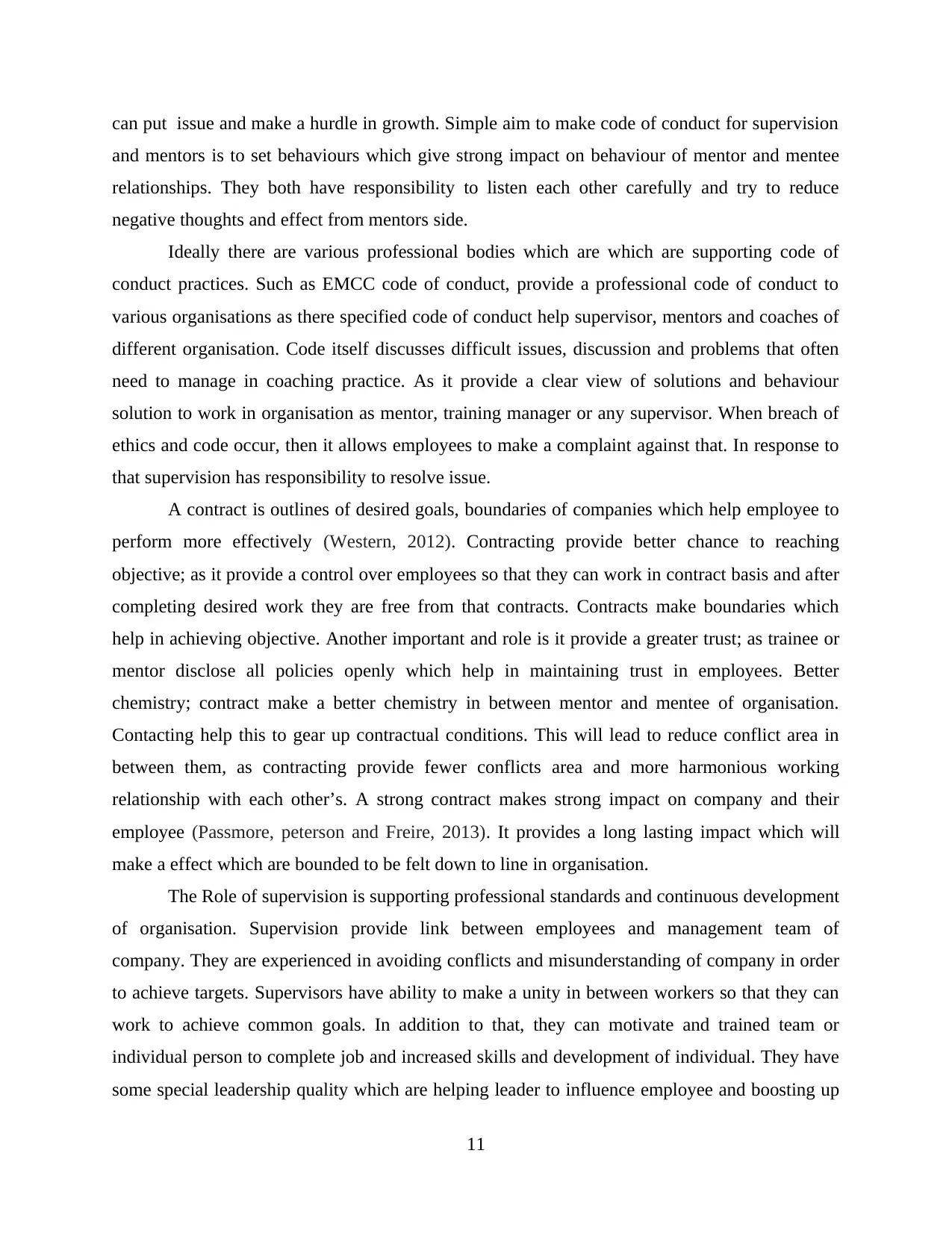
can put issue and make a hurdle in growth. Simple aim to make code of conduct for supervision
and mentors is to set behaviours which give strong impact on behaviour of mentor and mentee
relationships. They both have responsibility to listen each other carefully and try to reduce
negative thoughts and effect from mentors side.
Ideally there are various professional bodies which are which are supporting code of
conduct practices. Such as EMCC code of conduct, provide a professional code of conduct to
various organisations as there specified code of conduct help supervisor, mentors and coaches of
different organisation. Code itself discusses difficult issues, discussion and problems that often
need to manage in coaching practice. As it provide a clear view of solutions and behaviour
solution to work in organisation as mentor, training manager or any supervisor. When breach of
ethics and code occur, then it allows employees to make a complaint against that. In response to
that supervision has responsibility to resolve issue.
A contract is outlines of desired goals, boundaries of companies which help employee to
perform more effectively (Western, 2012). Contracting provide better chance to reaching
objective; as it provide a control over employees so that they can work in contract basis and after
completing desired work they are free from that contracts. Contracts make boundaries which
help in achieving objective. Another important and role is it provide a greater trust; as trainee or
mentor disclose all policies openly which help in maintaining trust in employees. Better
chemistry; contract make a better chemistry in between mentor and mentee of organisation.
Contacting help this to gear up contractual conditions. This will lead to reduce conflict area in
between them, as contracting provide fewer conflicts area and more harmonious working
relationship with each other’s. A strong contract makes strong impact on company and their
employee (Passmore, peterson and Freire, 2013). It provides a long lasting impact which will
make a effect which are bounded to be felt down to line in organisation.
The Role of supervision is supporting professional standards and continuous development
of organisation. Supervision provide link between employees and management team of
company. They are experienced in avoiding conflicts and misunderstanding of company in order
to achieve targets. Supervisors have ability to make a unity in between workers so that they can
work to achieve common goals. In addition to that, they can motivate and trained team or
individual person to complete job and increased skills and development of individual. They have
some special leadership quality which are helping leader to influence employee and boosting up
11
and mentors is to set behaviours which give strong impact on behaviour of mentor and mentee
relationships. They both have responsibility to listen each other carefully and try to reduce
negative thoughts and effect from mentors side.
Ideally there are various professional bodies which are which are supporting code of
conduct practices. Such as EMCC code of conduct, provide a professional code of conduct to
various organisations as there specified code of conduct help supervisor, mentors and coaches of
different organisation. Code itself discusses difficult issues, discussion and problems that often
need to manage in coaching practice. As it provide a clear view of solutions and behaviour
solution to work in organisation as mentor, training manager or any supervisor. When breach of
ethics and code occur, then it allows employees to make a complaint against that. In response to
that supervision has responsibility to resolve issue.
A contract is outlines of desired goals, boundaries of companies which help employee to
perform more effectively (Western, 2012). Contracting provide better chance to reaching
objective; as it provide a control over employees so that they can work in contract basis and after
completing desired work they are free from that contracts. Contracts make boundaries which
help in achieving objective. Another important and role is it provide a greater trust; as trainee or
mentor disclose all policies openly which help in maintaining trust in employees. Better
chemistry; contract make a better chemistry in between mentor and mentee of organisation.
Contacting help this to gear up contractual conditions. This will lead to reduce conflict area in
between them, as contracting provide fewer conflicts area and more harmonious working
relationship with each other’s. A strong contract makes strong impact on company and their
employee (Passmore, peterson and Freire, 2013). It provides a long lasting impact which will
make a effect which are bounded to be felt down to line in organisation.
The Role of supervision is supporting professional standards and continuous development
of organisation. Supervision provide link between employees and management team of
company. They are experienced in avoiding conflicts and misunderstanding of company in order
to achieve targets. Supervisors have ability to make a unity in between workers so that they can
work to achieve common goals. In addition to that, they can motivate and trained team or
individual person to complete job and increased skills and development of individual. They have
some special leadership quality which are helping leader to influence employee and boosting up
11
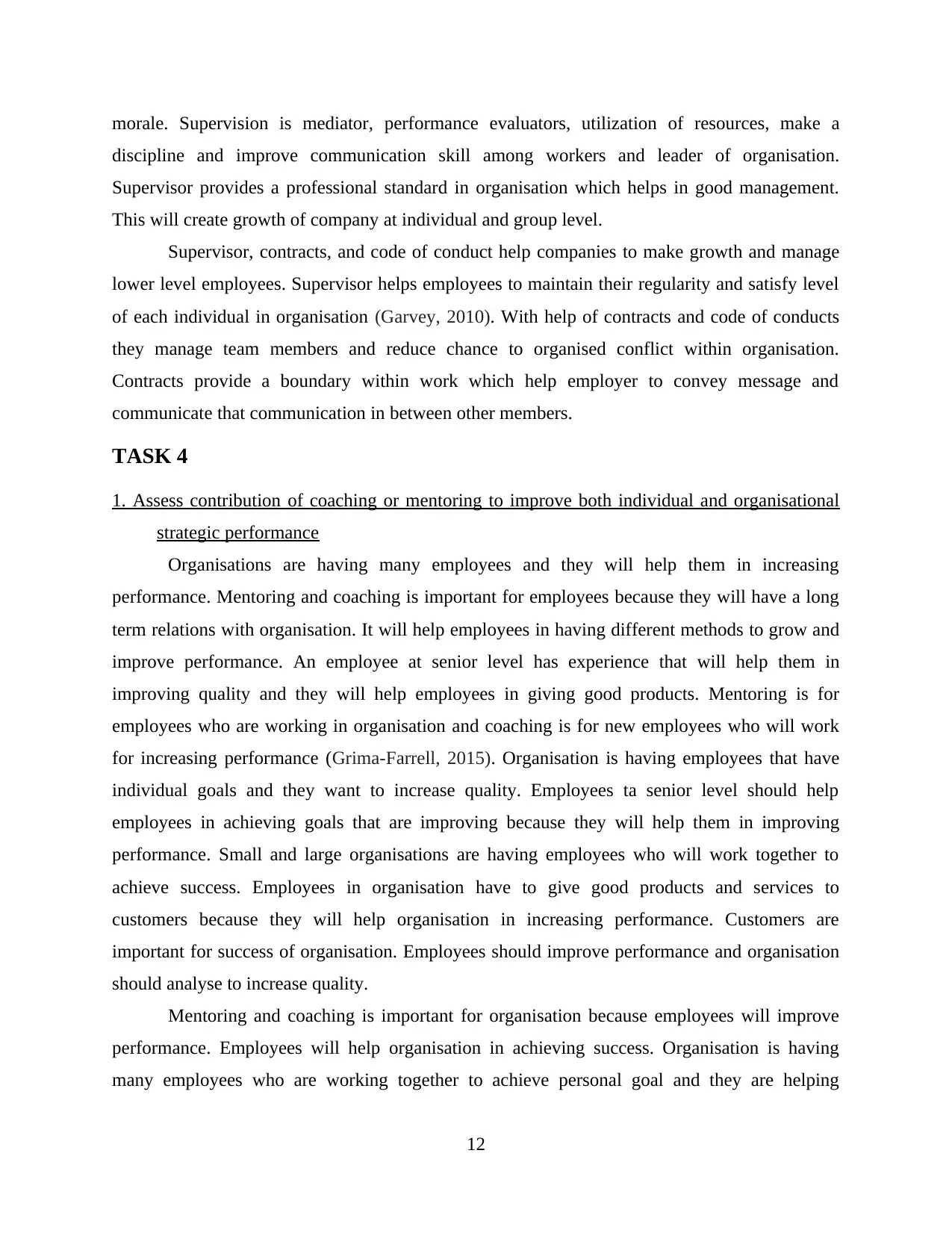
morale. Supervision is mediator, performance evaluators, utilization of resources, make a
discipline and improve communication skill among workers and leader of organisation.
Supervisor provides a professional standard in organisation which helps in good management.
This will create growth of company at individual and group level.
Supervisor, contracts, and code of conduct help companies to make growth and manage
lower level employees. Supervisor helps employees to maintain their regularity and satisfy level
of each individual in organisation (Garvey, 2010). With help of contracts and code of conducts
they manage team members and reduce chance to organised conflict within organisation.
Contracts provide a boundary within work which help employer to convey message and
communicate that communication in between other members.
TASK 4
1. Assess contribution of coaching or mentoring to improve both individual and organisational
strategic performance
Organisations are having many employees and they will help them in increasing
performance. Mentoring and coaching is important for employees because they will have a long
term relations with organisation. It will help employees in having different methods to grow and
improve performance. An employee at senior level has experience that will help them in
improving quality and they will help employees in giving good products. Mentoring is for
employees who are working in organisation and coaching is for new employees who will work
for increasing performance (Grima-Farrell, 2015). Organisation is having employees that have
individual goals and they want to increase quality. Employees ta senior level should help
employees in achieving goals that are improving because they will help them in improving
performance. Small and large organisations are having employees who will work together to
achieve success. Employees in organisation have to give good products and services to
customers because they will help organisation in increasing performance. Customers are
important for success of organisation. Employees should improve performance and organisation
should analyse to increase quality.
Mentoring and coaching is important for organisation because employees will improve
performance. Employees will help organisation in achieving success. Organisation is having
many employees who are working together to achieve personal goal and they are helping
12
discipline and improve communication skill among workers and leader of organisation.
Supervisor provides a professional standard in organisation which helps in good management.
This will create growth of company at individual and group level.
Supervisor, contracts, and code of conduct help companies to make growth and manage
lower level employees. Supervisor helps employees to maintain their regularity and satisfy level
of each individual in organisation (Garvey, 2010). With help of contracts and code of conducts
they manage team members and reduce chance to organised conflict within organisation.
Contracts provide a boundary within work which help employer to convey message and
communicate that communication in between other members.
TASK 4
1. Assess contribution of coaching or mentoring to improve both individual and organisational
strategic performance
Organisations are having many employees and they will help them in increasing
performance. Mentoring and coaching is important for employees because they will have a long
term relations with organisation. It will help employees in having different methods to grow and
improve performance. An employee at senior level has experience that will help them in
improving quality and they will help employees in giving good products. Mentoring is for
employees who are working in organisation and coaching is for new employees who will work
for increasing performance (Grima-Farrell, 2015). Organisation is having employees that have
individual goals and they want to increase quality. Employees ta senior level should help
employees in achieving goals that are improving because they will help them in improving
performance. Small and large organisations are having employees who will work together to
achieve success. Employees in organisation have to give good products and services to
customers because they will help organisation in increasing performance. Customers are
important for success of organisation. Employees should improve performance and organisation
should analyse to increase quality.
Mentoring and coaching is important for organisation because employees will improve
performance. Employees will help organisation in achieving success. Organisation is having
many employees who are working together to achieve personal goal and they are helping
12
⊘ This is a preview!⊘
Do you want full access?
Subscribe today to unlock all pages.

Trusted by 1+ million students worldwide
1 out of 34
Related Documents
Your All-in-One AI-Powered Toolkit for Academic Success.
+13062052269
info@desklib.com
Available 24*7 on WhatsApp / Email
![[object Object]](/_next/static/media/star-bottom.7253800d.svg)
Unlock your academic potential
Copyright © 2020–2026 A2Z Services. All Rights Reserved. Developed and managed by ZUCOL.





